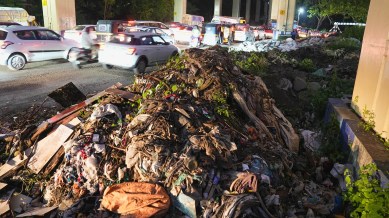Click here to join Express Pune WhatsApp channel and get a curated list of our stories
When trash breeds trouble: Doctors warn of disease risks
Stagnant water that collects in discarded waste items become breeding grounds for mosquitoes responsible for spreading illnesses like dengue and chikungunya.

Despite proactive measures by municipal health authorities, rapid urbanisation and several challenges have led to recurrent outbreaks of diseases like dengue and chikungunya in Pune over the past decade. Among these, experts said that improperly managed garbage creates ideal conditions for the proliferation of disease-carrying vectors such as mosquitoes, rats and flies.
Stagnant water that collects in discarded waste items become breeding grounds for mosquitoes responsible for spreading illnesses like dengue and chikungunya. For instance, sites for mosquito breeding include discarded tyres and paper cups that can hold water.
monthly limit of free stories.
with an Express account.
Dr M S Chadha, a former senior scientist with the National Institute of Virology, said that stagnant water near accumulated garbage provides mosquitoes a breeding ground and must be properly managed. In the past, the city has faced outbreaks of other illnesses including Zika virus and the neurological disorder Guillain-Barré syndrome.
According to Dr Amit Dravid, infectious diseases specialist at Poona Hospital, there is a need to sort out the issue of improperly managed garbage on a war footing. “Enteric fevers such as typhoid are often linked to poor sanitation and garbage accumulation. While doctors provide immediate care and treatment, it is crucial to address the root causes to effectively combat the disease,” Dr Dravid said.
ENT specialist Dr Seemab Shaikh said he has seen firsthand the impact of garbage on city life and essentially in Pune. “The improper disposal of waste not only pollutes our environment but also poses serious health risks. Toxic fumes emitted from garbage dumps and landfills can trigger respiratory issues like asthma, bronchitis and other breathing problems. It is crucial that we take immediate action to manage our waste effectively and reduce the harmful effects on our health and environment,” Dr Shaikh said.
Dr Pradeep Awate, former state epidemiologist, who leads a technical support unit at National Centre for Disease Control, spoke about the impact of accumulated garbage on One Health – the interconnected health of people, animals and the environment. “Poor waste management can facilitate the spread of zoonotic diseases (those transmitted between animals and humans) increasing the risk of outbreaks,” he said.
According to Dr Mayur Kardile, consultant spine surgeon at Jehangir hospital, unattended garbage often attracts stray animals, especially dogs that feed on it. “If a stray dog suddenly comes in the way, two-wheeler riders may be forced to swerve to avoid the animal, sometimes resulting in accidents and injuries like knee fractures. At the orthopaedic out patient department, we have treated such patients,” Dr Kardile said.
Dr Rajan Sancheti, former president of Indian Medical Association’s Pune unit, said that burning or improper disposal of waste can release harmful chemicals that can lead to chronic illness. “The decomposition of organic waste releases harmful gases and foul odours that contribute to air pollution and respiratory problems,” Dr Sancheti said.
Dr Chadha also observed there was a need to ensure proper disposal of waste from smaller nursing homes or laboratories. “There are chances of infection like Hepatitis B in case the discarded products are not properly decontaminated, as anyone handling the product and in case has a broken skin injury, stands at risk of infection,” Dr Chadha added. Experts also observed that hazardous material in garbage, like batteries and chemicals, can leach into the soil and contaminate water sources leading to serious illnesses if consumed or exposed to the skin.
Click here to join Express Pune WhatsApp channel and get a curated list of our stories